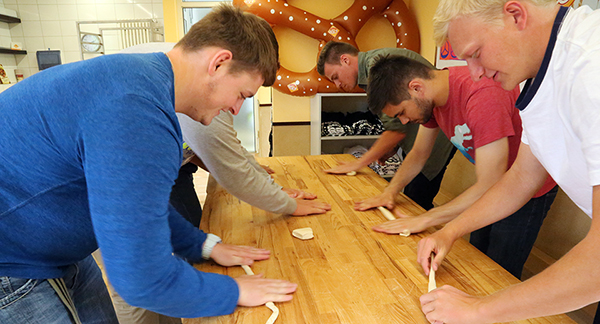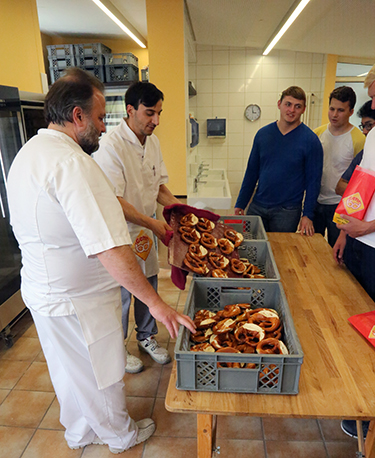
Erich Lange ‘19 – As we begin the second week of our trip, I have finally grown accustomed to the fact that I am actually in Germany. I am no longer in a classroom in Crawfordsville speaking German with nineteen and twenty year olds. For the first time ever, it has become necessary for my classmates and me to utilize our acquired German language skills in nearly every daily interaction — from purchasing a Döner Kebap at the corner store to asking a local resident for directions. Over the past two days of our immersion trip, our capabilities have continued to grow.

Unlike in the United States, the Monday after Pentecost is a holiday in Germany, thus we did not have “Unterricht”, or class, for the day. Instead, we worked on group projects on a topic of our choice. My group, in particular, did research on youth culture in Germany (specifically Tübingen). With the topics of our project spanning from music to politics to sports to modern slang, the best way for us to acquire the information needed for our project was to interview German students studying at the university in Tübingen. These interviews required us to not only use our German, but carry on a conversation regarding some pressing issues of the day — all in a foreign language.
Yet, immersion learning is about more than just the classroom. That’s why Monday afternoon, Professor Tucker took us on a tour of the city with the specific theme of Jewish life in Tübingen. Of course, when talking about Jewish history in Europe, the Holocaust is unavoidable. After visiting a memorial dedicated to the Jews of Tübingen, we walked a little over a mile into what seemed to be a normal, residential neighborhood. However, if you stopped to look at the sidewalk, you could see small, metal plates embedded in the pavement. The brass plates are placed at the home of Jewish families and people who were deported in the Holocaust. On the brass plate is the name of who lived there, the year they were born, when they were deported, the camp(s) they were at, and if they were liberated or killed in the concentration camps. The moment of clarity for me was when I saw the plate of Ruth Marx, an eight-year-old girl shot and killed alongside her mother outside a concentration camp. Until then, the Holocaust had always been something distant and in the past. It was not until that moment in which I stood at the door of that little girl’s home, in the street in which she played, that I fully understood the Holocaust’s magnitude and depth.

On Tuesday, class resumed in the morning. Former TA Elena Mezger never fails to make the class fun and enjoyable. In the afternoon, the students and faculty participated in a pretzel-making workshop at the “Gehr” bakery. There, we not only learned how to make authentic German pretzels, but also learned the history of pretzels and how they are tied in with the history of southern Germany.
After the workshop, we had our third meeting with our Tandem partners. These meetings are a time for us to casually sit down with a German student and practice our German in a conversational sitting. This was perhaps the most fun evening thus far, as we are finally settling into using German on a regular basis, and could truly interact with the Tandem partners on more than just a superficial level. Yet, perhaps even more important than practicing German with our Tandem partners is the cultural awareness that the Tandem meetings give us — teaching us understanding and acceptance.
This experience over the past ten days has truly been extraordinary, and I could not imagine having an experience like this were it not for the incredible opportunities Wabash offers. Immersion learning allow students to not only further develop their skills learned in the classroom, but learn the necessity of cultural acceptance and understanding, and what it truly means to think critically, act responsibly, lead effectively, and live humanely.